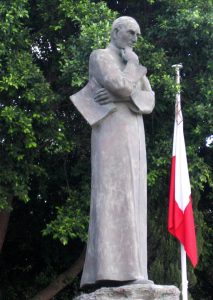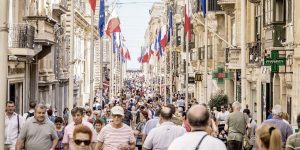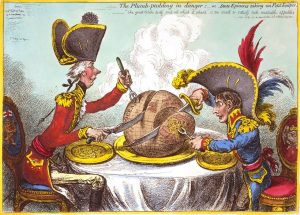First panel: On his way to Malta for his summit with President George Bush in December 1989, Soviet President Mikhail Gorbachev stopped at the Vatican to visit Pope John Paul II. The meeting took place on 1 December 1989. The document recording their conversation has been declassified and now we can learn how the two looked at the West, Europe and international relations.
Gorbachev and Pope John Paul II agreed that the world in general and Europe in particular, should not be hegemonised by “Western values”. Gorbachev tells the Pope: “… someone is already saying that Europe should be renewed only on the basis of Western values and anything that differs from them should be cut off. This is no way to treat nations, their history, traditions, and identities.”
Pope John Paul II replies: “It would be wrong for someone to claim that changes in Europe and the world should follow the Western model. This goes against my deep convictions. Europe, as a participant in world history, should breathe with two lungs. I thought about this relatively early, already in 1980, when I declared the patrons of Europe to be, besides Saint Benedict of the Latin tradition, Cyril and Methodius 7 representing the Eastern Byzantine, Greek, Slavic, and Russian traditions. This is my European credo.”
Gorbachev explains to the Pope that he was able to work well with US President Ronald Reagan when Reagan changed his attitude and respected Gorbachev as his equal: “At one point President Reagan tried to teach me how to conduct matters in our country. I told him that we would not be able to have a conversation like that. A conversation can only happen if it is based on realism and mutual respect. I told him: you are not a teacher, and I am not a student. You are not a prosecutor, and I am not a defendant. So, if we want to talk about politics, about how to change the world for the better, then we have to do it as equals. He understood this and we were able to do what we did.”
Ronald Reagan and Mikhail Gorbachev working together to sign the Intermediate-Range Nuclear Forces (INF) Treaty in 1987. The treaty eliminated an entire class of nuclear missiles. Their collaboration led to improved relations between the United States and the Soviet Union, which was seen as setting the stage for the end of the Cold War and the healing of a divided Europe.
But as NATO enlargement and the proxy war in Ukraine show, instead of considering Russia as an equal with whom to cohabit in a European Common Home, a Transatlantic network that still wants to dominate the world, has continued to want Russia to be a submissive neighbour, and preferably a defeated enemy.
“An old aunt”
Second Panel: On 25 August 2023, Gerard Araud wrote an article in ‘The Telegraph’ called ‘Deluded Europe can’t see that it’s finished’. Araud is a former French ambassador to the United States. He wrote: “We Europeans are still convinced of the centrality of our small continent not only to the history of mankind but to shaping the world today. We lecture everyone else …”
According to Araud, the EU has not noticed how much the world has changed: “It is no surprise that, in 2016, Barack Obama in an interview with ‘The Atlantic’ seemed to believe that the future of humankind would be decided between New Delhi, Beijing and Los Angeles… Indeed, when I served as France’s ambassador to Washington, I noticed the extent to which our supposed heirs viewed us instead with a mixture of indifference, fatigue and neglect. We were the old aunt whose rambling utterances were more or less gently ignored.”
Araud concluded that as the EU is unable to reverse its demographic suicide and open itself up to the new multipolar world, it is condemning itself to geopolitical irrelevance. “Are we Europeans able to prove that we still matter, that we are not just some peripheral touristic destination? Every signal is pointing towards an inward-looking Europe. Un continent de vieux. The future of humankind will definitely be decided elsewhere.”
The sheep and the wolf
Third Panel: On 27 July 2025, European Commission President Ursula von der Leyen and US President Donald J. Trump agreed a deal on tariffs and trade. Under the agreement EU products face 15% tariffs in the US market while American goods enter Europe levy-free. Face to face on his golf course in Scotland, Trump forced von der Leyen to accept that the EU should purchase an unspecified amount of military equipment from the US and $750 billion worth of US energy, and to pledge $600 billion in European corporate investments in America. From her bunker in Brussels, Von der Leyen had threatened tariff retaliation by Europe but this turned out to be be bombastic posturing.
Former Prime Minister of Italy and former President of the European Commission Romano Prodi scolded von der Leyen for succumbing so meekly to Trump: “Politics isn’t about being humiliated by the powerful: a sheep will be eaten by a wolf.” In his time the EU succeeded, with Mario Monti commissioner for Antitrust, to stand up and fine an American high tech giant like Microsoft that distorted competition.
In 2018, when Donald Trump threatened to impose tariffs on European cars, then-president of the European Commission, Jean-Claude Juncker, responded: “So now we will also impose import tariffs. This is basically a stupid process, the fact that we have to do this. But we have to do it. We will now impose tariffs on motorcycles, Harley Davidson, on blue jeans, Levis, on Bourbon. We can also do stupid. We also have to be this stupid,”
It wasn’t long before the two economic blocs agreed to put further tariffs on hold. It was a different time. Juncker, of course, was cut from a different cloth compared to today’s Commission president Ursula von der Leyen.
Times of Malta 29 August 2025




